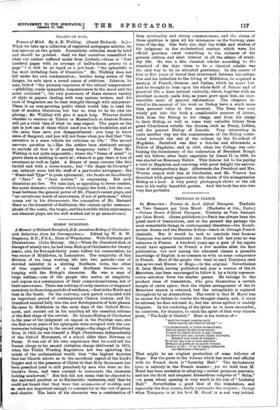FRAMES OF MIND.
Frames of Mind. By A. B. Walkley. (Grant Richards. 5s.)— When we take up a collection of reprinted newspaper articles, we feel nervous on two points. Journalistic criticism must be brief and should be pointed : shall we find ourselves committed to what our author suffered under from Joubert,—three or " four hundred pages with an average of half-a-dozen pensees to a page " ? it will be as vapid as a jest-book : " the aphoristic is the most irritating form of literature." Mr. Walkley does not fall under his own condemnation ; besides being aware of the danger, he acts upon a sound canon of criticism. Johnson, he says, lacked "the primary requisites of the critical temperament —pliability, ready sympathy, responsiveness to the mood and the mind criticised " ; his own possession of these ensures variety of style in papers dealing with very various writers, and his book of fragments can be read straight through with enjoyment. There is an ever-growing public which would like to read the best of modern literature, but has no time to do its own ex- ploring; Mr. Walkley will give it much help. Whoever doubts whether to venture on Tolstoi or Maeterlinck or Anatole-France will get a vivid idea of what he may expect. The paper on the last is just one of those which send you to the bookseller, and at the same time save you disappointment : you long to know more of Bergeret, and you will not fume when you find that "the narrative is a mere vehicle for criticism on life." The second nervous question is,—Has the author been abstinent enough to exclude all that is of merely temporary value ? Here Mr. Walkley is not quite impeccable ; where the " frame of mind" is grave there is nothing to cavil at ; where it is gay there is loss of sweetness as well as light. A dinner of many courses like this shoUld end with a bonne bouche ; but "Sir Boger de Coverley " can interest none but the staff of a particular newspaper ; the "Music-hall Type" is quite ephemeral ; the facetious familiarity of "Jane " in " Jane Austen " is unpleasing. But such blemishes are few. We take last, as appealing to fewer readers, the acute dramatic criticism which begins the book ; but the con- trast between the general power of Mr. Pinero's recent plays, and "an unwelcome touch of narrowness, if not of paltriness," which comes out in his denouements, the conception of Mr. Bernard Shaw as the dramatist of disillusion, the carious cyclic metamor- phosis of the comic, the tragic, and the horrible which rejuvenates our classical plays, are too well worked out to go unmentioned.


















































 Previous page
Previous page